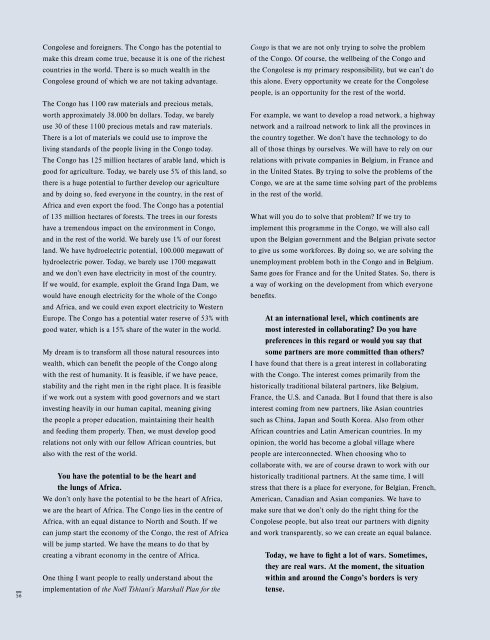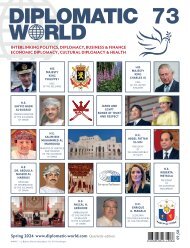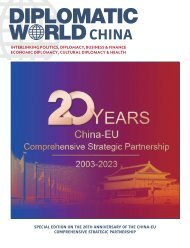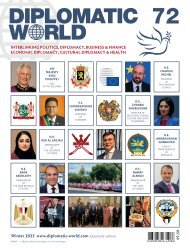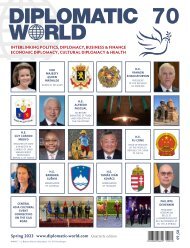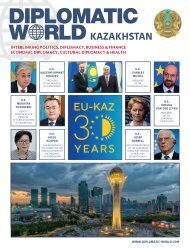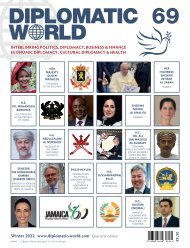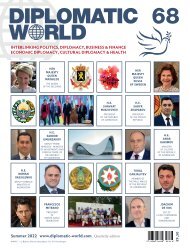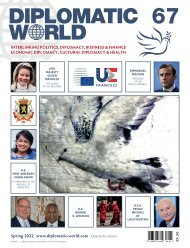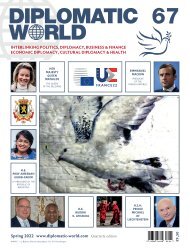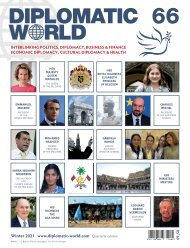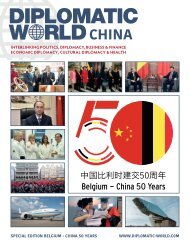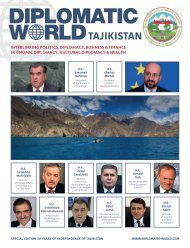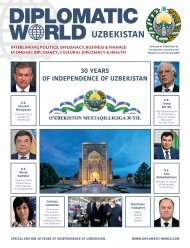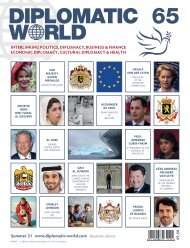Diplomatic World nummer 54
You also want an ePaper? Increase the reach of your titles
YUMPU automatically turns print PDFs into web optimized ePapers that Google loves.
56<br />
Congolese and foreigners. The Congo has the potential to<br />
make this dream come true, because it is one of the richest<br />
countries in the world. There is so much wealth in the<br />
Congolese ground of which we are not taking advantage.<br />
The Congo has 1100 raw materials and precious metals,<br />
worth approximately 38.000 bn dollars. Today, we barely<br />
use 30 of these 1100 precious metals and raw materials.<br />
There is a lot of materials we could use to improve the<br />
living standards of the people living in the Congo today.<br />
The Congo has 125 million hectares of arable land, which is<br />
good for agriculture. Today, we barely use 5% of this land, so<br />
there is a huge potential to further develop our agriculture<br />
and by doing so, feed everyone in the country, in the rest of<br />
Africa and even export the food. The Congo has a potential<br />
of 135 million hectares of forests. The trees in our forests<br />
have a tremendous impact on the environment in Congo,<br />
and in the rest of the world. We barely use 1% of our forest<br />
land. We have hydroelectric potential, 100.000 megawatt of<br />
hydroelectric power. Today, we barely use 1700 megawatt<br />
and we don’t even have electricity in most of the country.<br />
If we would, for example, exploit the Grand Inga Dam, we<br />
would have enough electricity for the whole of the Congo<br />
and Africa, and we could even export electricity to Western<br />
Europe. The Congo has a potential water reserve of 53% with<br />
good water, which is a 15% share of the water in the world.<br />
My dream is to transform all those natural resources into<br />
wealth, which can benefit the people of the Congo along<br />
with the rest of humanity. It is feasible, if we have peace,<br />
stability and the right men in the right place. It is feasible<br />
if we work out a system with good governors and we start<br />
investing heavily in our human capital, meaning giving<br />
the people a proper education, maintaining their health<br />
and feeding them properly. Then, we must develop good<br />
relations not only with our fellow African countries, but<br />
also with the rest of the world.<br />
You have the potential to be the heart and<br />
the lungs of Africa.<br />
We don’t only have the potential to be the heart of Africa,<br />
we are the heart of Africa. The Congo lies in the centre of<br />
Africa, with an equal distance to North and South. If we<br />
can jump start the economy of the Congo, the rest of Africa<br />
will be jump started. We have the means to do that by<br />
creating a vibrant economy in the centre of Africa.<br />
One thing I want people to really understand about the<br />
implementation of the Noël Tshiani’s Marshall Plan for the<br />
Congo is that we are not only trying to solve the problem<br />
of the Congo. Of course, the wellbeing of the Congo and<br />
the Congolese is my primary responsibility, but we can’t do<br />
this alone. Every opportunity we create for the Congolese<br />
people, is an opportunity for the rest of the world.<br />
For example, we want to develop a road network, a highway<br />
network and a railroad network to link all the provinces in<br />
the country together. We don’t have the technology to do<br />
all of those things by ourselves. We will have to rely on our<br />
relations with private companies in Belgium, in France and<br />
in the United States. By trying to solve the problems of the<br />
Congo, we are at the same time solving part of the problems<br />
in the rest of the world.<br />
What will you do to solve that problem? If we try to<br />
implement this programme in the Congo, we will also call<br />
upon the Belgian government and the Belgian private sector<br />
to give us some workforces. By doing so, we are solving the<br />
unemployment problem both in the Congo and in Belgium.<br />
Same goes for France and for the United States. So, there is<br />
a way of working on the development from which everyone<br />
benefits.<br />
At an international level, which continents are<br />
most interested in collaborating? Do you have<br />
preferences in this regard or would you say that<br />
some partners are more committed than others?<br />
I have found that there is a great interest in collaborating<br />
with the Congo. The interest comes primarily from the<br />
historically traditional bilateral partners, like Belgium,<br />
France, the U.S. and Canada. But I found that there is also<br />
interest coming from new partners, like Asian countries<br />
such as China, Japan and South Korea. Also from other<br />
African countries and Latin American countries. In my<br />
opinion, the world has become a global village where<br />
people are interconnected. When choosing who to<br />
collaborate with, we are of course drawn to work with our<br />
historically traditional partners. At the same time, I will<br />
stress that there is a place for everyone, for Belgian, French,<br />
American, Canadian and Asian companies. We have to<br />
make sure that we don’t only do the right thing for the<br />
Congolese people, but also treat our partners with dignity<br />
and work transparently, so we can create an equal balance.<br />
Today, we have to fight a lot of wars. Sometimes,<br />
they are real wars. At the moment, the situation<br />
within and around the Congo’s borders is very<br />
tense.


